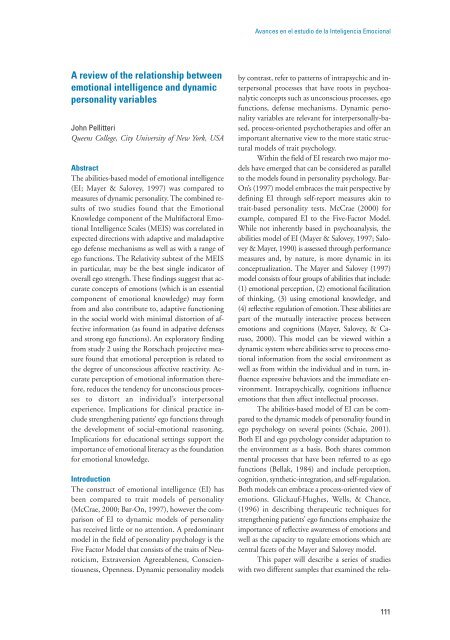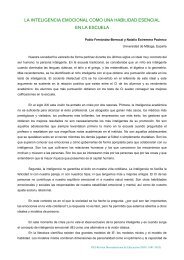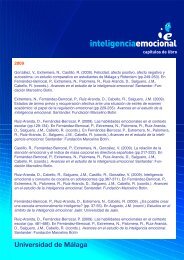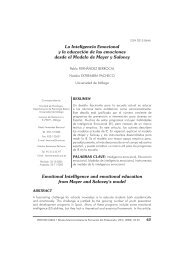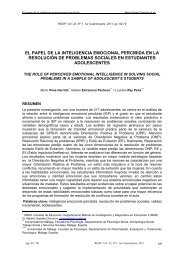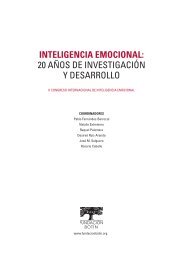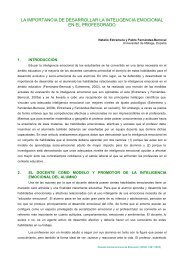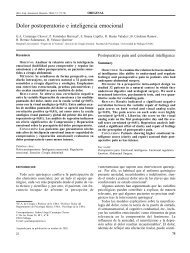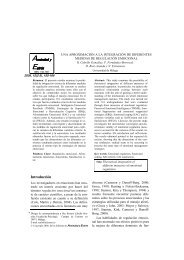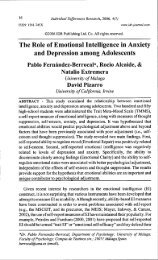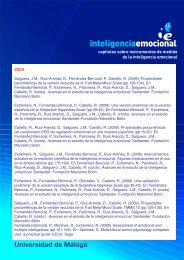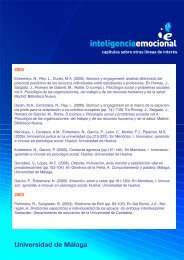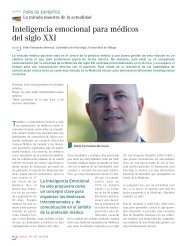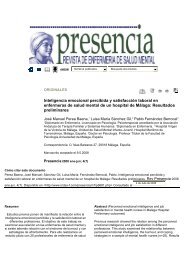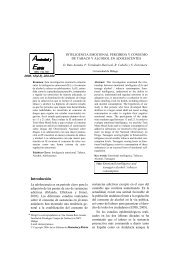Avances en el estudio de la Inteligencia Emocional
Avances en el estudio de la Inteligencia Emocional
Avances en el estudio de la Inteligencia Emocional
Create successful ePaper yourself
Turn your PDF publications into a flip-book with our unique Google optimized e-Paper software.
<strong>Avances</strong> <strong>en</strong> <strong>el</strong> <strong>estudio</strong> <strong>de</strong> <strong>la</strong> Int<strong>el</strong>ig<strong>en</strong>cia <strong>Emocional</strong><br />
A review of the r<strong>el</strong>ationship betwe<strong>en</strong><br />
emotional int<strong>el</strong>lig<strong>en</strong>ce and dynamic<br />
personality variables<br />
John P<strong>el</strong>litteri<br />
Que<strong>en</strong>s College, City University of New York, USA<br />
Abstract<br />
The abilities-based mod<strong>el</strong> of emotional int<strong>el</strong>lig<strong>en</strong>ce<br />
(EI; Mayer & Salovey, 1997) was compared to<br />
measures of dynamic personality. The combined results<br />
of two studies found that the Emotional<br />
Knowledge compon<strong>en</strong>t of the Multifactoral Emotional<br />
Int<strong>el</strong>lig<strong>en</strong>ce Scales (MEIS) was corr<strong>el</strong>ated in<br />
expected directions with adaptive and ma<strong>la</strong>daptive<br />
ego <strong>de</strong>f<strong>en</strong>se mechanisms as w<strong>el</strong>l as with a range of<br />
ego functions. The R<strong>el</strong>ativity subtest of the MEIS<br />
in particu<strong>la</strong>r, may be the best single indicator of<br />
overall ego str<strong>en</strong>gth. These findings suggest that accurate<br />
concepts of emotions (which is an ess<strong>en</strong>tial<br />
compon<strong>en</strong>t of emotional knowledge) may form<br />
from and also contribute to, adaptive functioning<br />
in the social world with minimal distortion of affective<br />
information (as found in adpative <strong>de</strong>f<strong>en</strong>ses<br />
and strong ego functions). An exploratory finding<br />
from study 2 using the Rorschach projective measure<br />
found that emotional perception is r<strong>el</strong>ated to<br />
the <strong>de</strong>gree of unconscious affective reactivity. Accurate<br />
perception of emotional information therefore,<br />
reduces the t<strong>en</strong>d<strong>en</strong>cy for unconscious processes<br />
to distort an individual’s interpersonal<br />
experi<strong>en</strong>ce. Implications for clinical practice inclu<strong>de</strong><br />
str<strong>en</strong>gth<strong>en</strong>ing pati<strong>en</strong>ts’ ego functions through<br />
the <strong>de</strong>v<strong>el</strong>opm<strong>en</strong>t of social-emotional reasoning.<br />
Implications for educational settings support the<br />
importance of emotional literacy as the foundation<br />
for emotional knowledge.<br />
Introduction<br />
The construct of emotional int<strong>el</strong>lig<strong>en</strong>ce (EI) has<br />
be<strong>en</strong> compared to trait mod<strong>el</strong>s of personality<br />
(McCrae, 2000; Bar-On, 1997), however the comparison<br />
of EI to dynamic mod<strong>el</strong>s of personality<br />
has received little or no att<strong>en</strong>tion. A predominant<br />
mod<strong>el</strong> in the fi<strong>el</strong>d of personality psychology is the<br />
Five Factor Mod<strong>el</strong> that consists of the traits of Neuroticism,<br />
Extraversion Agreeabl<strong>en</strong>ess, Consci<strong>en</strong>tiousness,<br />
Op<strong>en</strong>ness. Dynamic personality mod<strong>el</strong>s<br />
by contrast, refer to patterns of intrapsychic and interpersonal<br />
processes that have roots in psychoanalytic<br />
concepts such as unconscious processes, ego<br />
functions, <strong>de</strong>f<strong>en</strong>se mechanisms. Dynamic personality<br />
variables are r<strong>el</strong>evant for interpersonally-based,<br />
process-ori<strong>en</strong>ted psychotherapies and offer an<br />
important alternative view to the more static structural<br />
mod<strong>el</strong>s of trait psychology.<br />
Within the fi<strong>el</strong>d of EI research two major mod<strong>el</strong>s<br />
have emerged that can be consi<strong>de</strong>red as parall<strong>el</strong><br />
to the mod<strong>el</strong>s found in personality psychology. Bar-<br />
On’s (1997) mod<strong>el</strong> embraces the trait perspective by<br />
<strong>de</strong>fining EI through s<strong>el</strong>f-report measures akin to<br />
trait-based personality tests. McCrae (2000) for<br />
example, compared EI to the Five-Factor Mod<strong>el</strong>.<br />
While not inher<strong>en</strong>tly based in psychoanalysis, the<br />
abilities mod<strong>el</strong> of EI (Mayer & Salovey, 1997; Salovey<br />
& Mayer, 1990) is assessed through performance<br />
measures and, by nature, is more dynamic in its<br />
conceptualization. The Mayer and Salovey (1997)<br />
mod<strong>el</strong> consists of four groups of abilities that inclu<strong>de</strong>:<br />
(1) emotional perception, (2) emotional facilitation<br />
of thinking, (3) using emotional knowledge, and<br />
(4) reflective regu<strong>la</strong>tion of emotion. These abilities are<br />
part of the mutually interactive process betwe<strong>en</strong><br />
emotions and cognitions (Mayer, Salovey, & Caruso,<br />
2000). This mod<strong>el</strong> can be viewed within a<br />
dynamic system where abilities serve to process emotional<br />
information from the social <strong>en</strong>vironm<strong>en</strong>t as<br />
w<strong>el</strong>l as from within the individual and in turn, influ<strong>en</strong>ce<br />
expressive behaviors and the immediate <strong>en</strong>vironm<strong>en</strong>t.<br />
Intrapsychically, cognitions influ<strong>en</strong>ce<br />
emotions that th<strong>en</strong> affect int<strong>el</strong>lectual processes.<br />
The abilities-based mod<strong>el</strong> of EI can be compared<br />
to the dynamic mod<strong>el</strong>s of personality found in<br />
ego psychology on several points (Schaie, 2001).<br />
Both EI and ego psychology consi<strong>de</strong>r adaptation to<br />
the <strong>en</strong>vironm<strong>en</strong>t as a basis. Both shares common<br />
m<strong>en</strong>tal processes that have be<strong>en</strong> referred to as ego<br />
functions (B<strong>el</strong><strong>la</strong>k, 1984) and inclu<strong>de</strong> perception,<br />
cognition, synthetic-integration, and s<strong>el</strong>f-regu<strong>la</strong>tion.<br />
Both mod<strong>el</strong>s can embrace a process-ori<strong>en</strong>ted view of<br />
emotions. Glickauf-Hughes, W<strong>el</strong>ls, & Chance,<br />
(1996) in <strong>de</strong>scribing therapeutic techniques for<br />
str<strong>en</strong>gth<strong>en</strong>ing pati<strong>en</strong>ts’ ego functions emphasize the<br />
importance of reflective awar<strong>en</strong>ess of emotions and<br />
w<strong>el</strong>l as the capacity to regu<strong>la</strong>te emotions which are<br />
c<strong>en</strong>tral facets of the Mayer and Salovey mod<strong>el</strong>.<br />
This paper will <strong>de</strong>scribe a series of studies<br />
with two differ<strong>en</strong>t samples that examined the r<strong>el</strong>a-<br />
111


